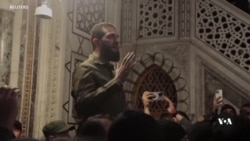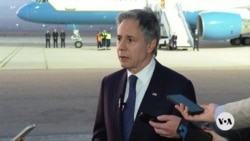Following the fall of Syrian President Bashar al-Assad's government, the Biden administration said it would fully support a transparent and inclusive transition process toward a nonsectarian government accountable to the Syrian people.
"The transition process and new government must also uphold clear commitments to fully respect the rights of minorities, facilitate the flow of humanitarian assistance to all in need, prevent Syria from being used as a base for terrorism or posing a threat to its neighbors, and ensure that any chemical or biological weapons stockpiles are secured and safely destroyed," U.S. Secretary of State Antony Blinken said in a statement on Tuesday.
U.S. recognition of a new government in Damascus could lead to the lifting of sanctions that have crippled the Syrian economy. It’s an incentive the Biden administration can leverage at a moment when the country’s future is deeply uncertain.
"What we want to see in terms of governance in Syria is governance that is seen as credible and legitimate, that is sustainable, that meets the aspirations of the Syrian people," White House national security communications adviser John Kirby said in an interview Tuesday with VOA. It has to be "the product of a Syrian-led process."
Hayat Tahrir al-Sham, the rebels who toppled Assad, is a U.S.-designated foreign terrorist group. Its leader, Abu Mohammed al-Jolani, has a $10 million bounty on his head.
"This victory, my brothers, is a new chapter in the history of the entire Islamic nation," he said in his first speech since his fighters rapidly took control of the country.
"It is a turning point for the region," he said, singling out Iran — a message he knows will be received well in Israel and the U.S. "He [Assad] handed Syria over to Iranian ambitions, spreading sectarianism and corruption throughout the country."
Jolani pledged in a statement Tuesday to "hold accountable" members of Assad’s regime who were "involved in torturing the Syrian people."
In recent years, he has espoused sectarian tolerance and distanced himself from extremist ideology. He has sought to reassure Syria’s ethnic and religious minorities, which include Christians, Kurds, Druze and the Alawite community, a sect from which the Assad family originates.
But by delivering his victory speech not from the presidential palace but from the Great Mosque of Umayyad in Damascus — built in the eighth century by a Sunni caliphate —Golani is sending a message to the region about his majoritarian movement.
His speech mirrors that of Islamic State’s first caliph, Abu Bakr al-Baghdadi, at the Great Mosque of al-Nuri in Mosul in 2014, Michael Rubin, a senior fellow at the American Enterprise Institute, told VOA.
"On the rebels’ own Telegram channel, there were statements saying, ‘We've taken the Umayyad Mosque. Next, we're going to go for Al-Aqsa,’ which is in Jerusalem, of course. ‘Then, we're going to go for the Kaaba,’ which is in Saudi Arabia," Rubin said.
US involvement
President Joe Biden has moved quickly, sending Blinken to Turkey and Jordan Wednesday to consult with leaders after ordering more than 70 airstrikes on Islamic State targets in Syria on Sunday.
"The United States will work with our partners and stakeholders in Syria to help them seize an opportunity to manage the risks," Biden said.
But on January 20, 2025, Biden will be replaced by President-elect Donald Trump, who is signaling that he wants the U.S. to stay out of the Syrian conflict.
"This is not our fight," Trump said on social media. "Let it play out. Do not get involved!"
But the U.S. is already involved. It has about 900 troops deployed in Syria and backs a Syrian Kurdish rebel group. Washington also has close ties with all of Syria's neighbors — Iraq, Lebanon, as well as allies Israel and Jordan, and NATO ally Turkey.
"They are directly impacted by what happens in Syria, and they are also in a position to influence what happens in Syria, for better or for worse," said Ryan Crocker, a former U.S. ambassador to Syria, Iraq and Lebanon.
"Don't disengage completely, certainly not," he told VOA. "But if you don't want to be overly engaged yourself, the United States of America, this is the time to work very closely with partners around the region."
Under Trump’s "America First" doctrine, it's unclear whether the U.S. would aim its diplomatic efforts toward what Biden wants — a future Syrian government that’s inclusive and nonsectarian.
Stakeholders make moves
Meanwhile, aside from the U.S., Israel and Turkey have bombed Syrian targets to protect their interests.
Israel has launched hundreds of strikes on military targets to further weaken what remains of the military of Tehran’s once-stalwart ally and keep weapons from falling into extremists’ hands.
In northern Syria, rebel groups supported by Turkey attacked U.S.-backed Kurdish fighters, who Ankara sees as allies of a separatist movement and displacing Syrian Kurds.
For now, Assad’s ally, Tehran, has lost much of its leverage. Weakened by the defeat of its proxies in Hezbollah in Lebanon and Hamas in Gaza, it may employ pragmatism in dealing with Damascus.
"The Iranian foreign minister has talked about the new Syrians as the victory of the opposition, whereas in the past, they wouldn't legitimize them as opposition. They spoke of them instead as terrorists," Rubin said, a signal that Tehran is weighing whether it can work with the incoming government.
Russia, another Assad backer who has provided asylum for the embattled leader and his family, is lobbying to keep its two military bases in Syria. On Monday, Kremlin spokesperson Dmitry Peskov said Moscow would enter talks with incoming authorities about Russia's future military presence.
Mohammed al-Bashir, Syria’s newly appointed caretaker prime minister who previously led the rebels’ civilian government, will run a transitional government until March 1, 2025, he said in remarks on Tuesday.
Begum Donmez Ersoz from VOA Turkish Service, Yulia Savchenko from VOA Russian Service and Jackson Mvunganyi from VOA English to Africa Service contributed to this story.







